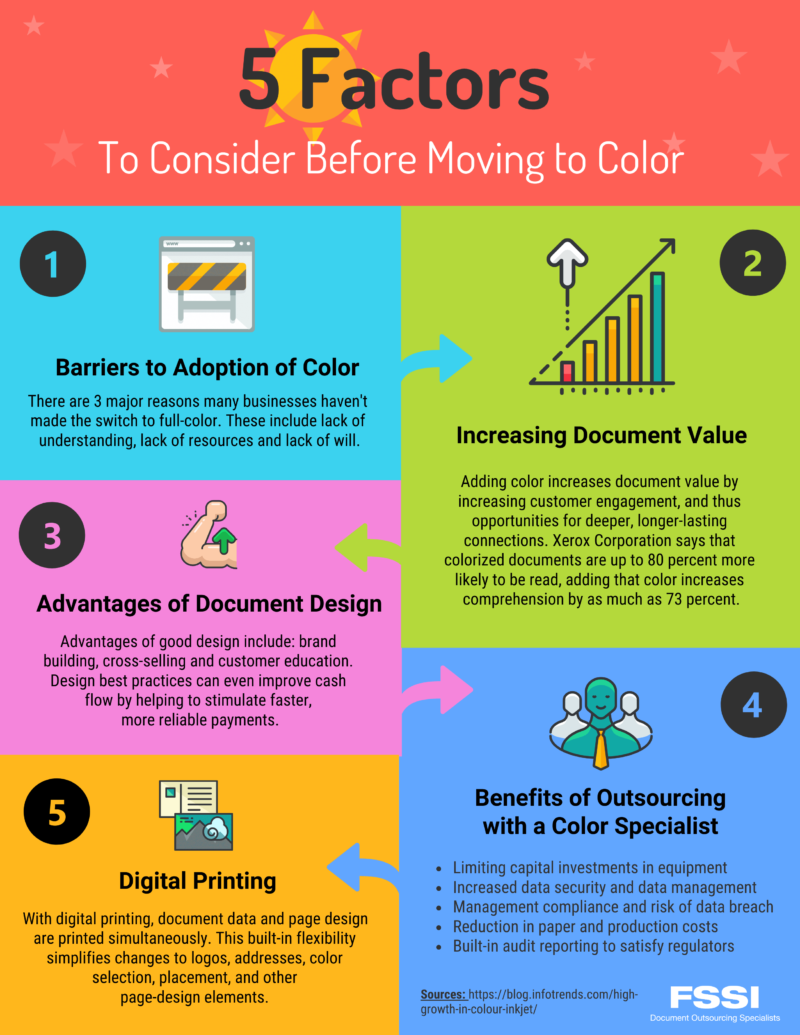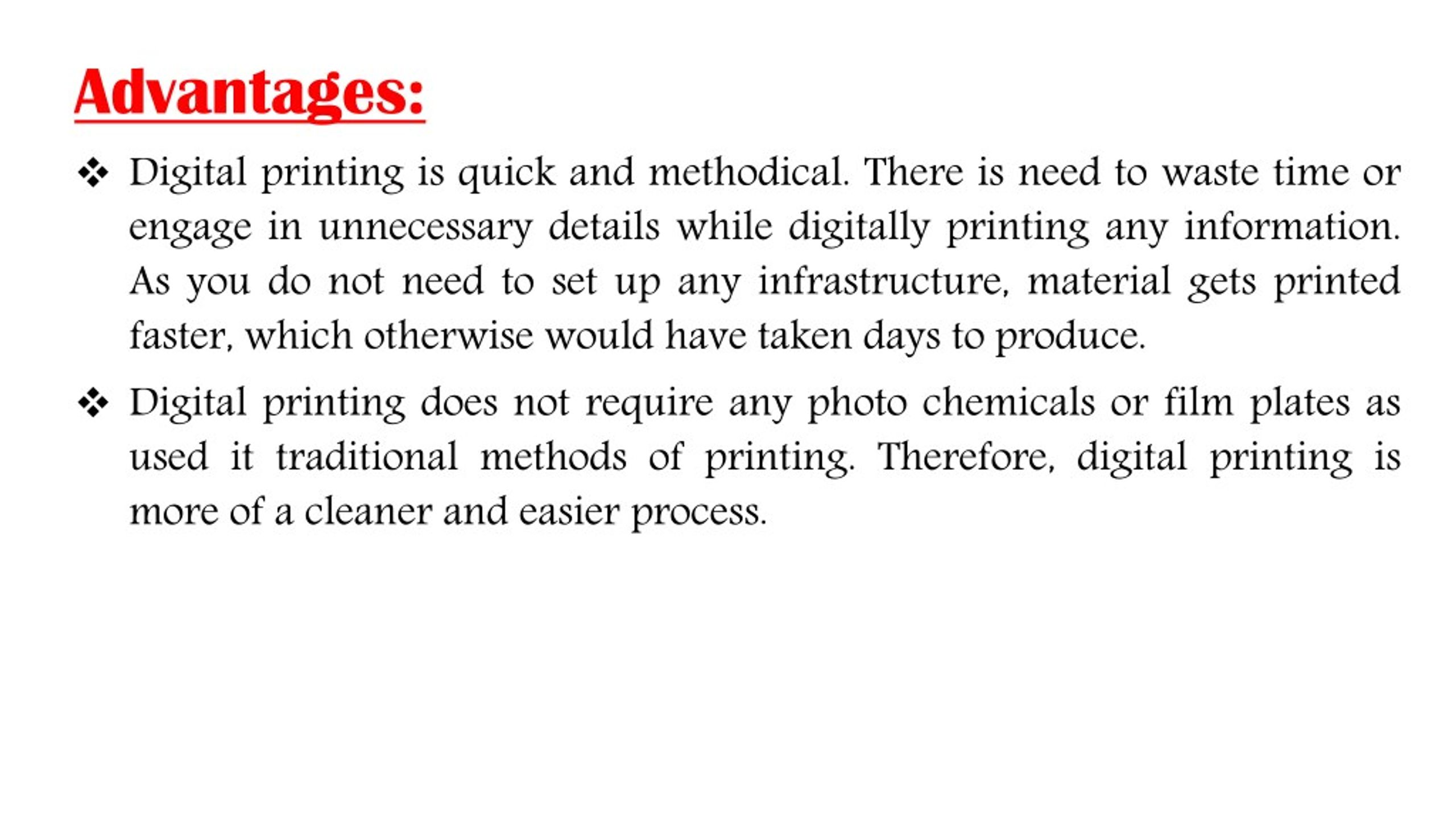Rumored Buzz on Digital Printing
Rumored Buzz on Digital Printing
Blog Article
Digital Printing - An Overview
Table of ContentsWhat Does Digital Printing Mean?See This Report about Digital PrintingDigital Printing Can Be Fun For AnyoneThe Greatest Guide To Digital PrintingDigital Printing Things To Know Before You BuyThe smart Trick of Digital Printing That Nobody is Talking About
Variable information printing, such as direct mail with customized codes and addresses, is ideally fit for digital printing. Digital fast printing just needs four actions of design, evaluation, printing and binding to get every little thing done. Digital quick printing has an unmatched advantage: print on need.According to PMMI, electronic printing permits brands and makers to react swiftly to client demands while improving the supply chain, decreasing warehousing price and waste, and enjoying faster time to market. That all sounds terrific, however how does this innovation do all that? The significant differentiator of these innovations is that there are no set-up charges and no plates with digital printing.
Digital Printing for Beginners
This results in quicker turnaround time and decreases price when making use of electronic printing.
Digital printing is highly versatile, so it's easy to make modifications to the plan layout quickly. It all goes back to the plates.
A lot more supply can imply even more waste down the road. With traditional printing techniques, short-run printing is simply not feasible. Because a fantastic style can make or damage your item, digital printing regularly develops top notch, clear and colorful graphics each time. Digital printing on adaptable pouches adds the brilliant, dynamic, and specific graphics that almost bid customers to connect and touch them.
Digital printing is the procedure of printing digital-based images straight onto a range of media substratums. There is no need for a printing plate, unlike with balanced out printing. Digital files such as PDFs or desktop computer posting files can be sent out straight to the digital printing machine to publish theoretically, picture paper, canvas, fabric, synthetics, cardstock and other substrates.
4 Easy Facts About Digital Printing Shown
According to PMMI, digital printing permits brands and producers to react quickly to customer needs while improving the supply chain, decreasing warehousing expense and waste, and taking pleasure in faster time to market. That all sounds terrific, yet how does this innovation do all that? The significant differentiator of these innovations is that there are no set up charges and no plates with digital printing.
According to Wikipedia, the best difference between electronic printing and conventional approaches such as lithography, flexography, gravure, or letterpress is that there is no need to replace printing plates in digital printing, whereas in these analog printing methods home plates are consistently replaced. This results in quicker turnaround time and lowers expense when using digital printing.

The Ultimate Guide To Digital Printing
Extra inventory can mean more waste down the roadway. With conventional printing approaches, short-run printing is just not feasible. Due to the fact that a wonderful layout can make or damage your product, electronic printing constantly produces top quality, clear and vivid graphics each time. Digital printing on versatile bags includes the brilliant, vivid, and accurate graphics that almost visit this site right here beckon customers to reach out and touch them.

According to PMMI, electronic printing allows brands and makers to react quickly to customer needs while enhancing the supply chain, lowering warehousing expense and waste, and enjoying faster time to market. That all audios excellent, however how does this technology do all that? The major differentiator of these modern technologies is that there are no set up fees and no plates with digital printing.
The Single Strategy To Use For Digital Printing
According to Wikipedia, the best difference in between electronic printing and typical techniques such as lithography, flexography, gravure, or letterpress is that there is no need to change printing plates in electronic printing, whereas in these analog printing techniques the plates are continuously replaced. This leads to quicker turnaround time and lowers expense when utilizing digital printing.
Speedy manufacturing over here suggests obtaining your item to market much faster. It additionally suggests it's easier and faster to make modifications in the future, when you change a recipe, include a SKU, or produce seasonal packaging. Digital printing is extremely flexible, so it's very easy to make adjustments to the plan layout rapidly. Everything returns to home plates.

How Digital Printing can Save You Time, Stress, and Money.
Digital printing is the process of printing digital-based photos directly onto a selection of media substrates. There is no demand for a printing plate, unlike with balanced out printing. Digital documents such as PDFs or desktop publishing data can be sent straight to the digital printing machine to publish theoretically, photo paper, canvas, textile, synthetics, cardstock and various other substratums.
Report this page